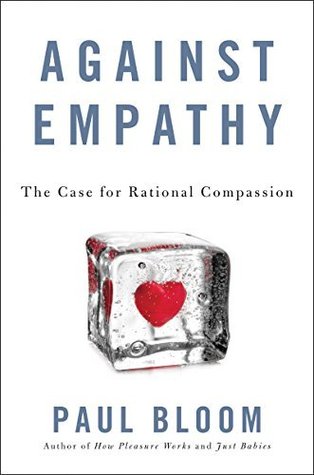More on this book
Community
Kindle Notes & Highlights
by
Paul Bloom
Read between
June 8 - June 9, 2022
First, our moral decisions and actions are powerfully shaped by the force of empathy. Second, this often makes the world worse. And, third, we have the capacity to do better.
empathy reflects our biases. Although we might intellectually believe that the suffering of our neighbor is just as awful as the suffering of someone living in another country, it’s far easier to empathize with those who are close to us, those who are similar to us, and those we see as more attractive or vulnerable and less scary.
There is a particular obsession with localization, as if knowing where something is in the brain is the key to explaining it.
the medial prefrontal cortex, just behind the forehead, is involved in mentalizing, while the anterior cingulate cortex, sitting right behind that, is involved in empathy.
Simon Baron-Cohen and Sally Wheelwright in the context of Baron-Cohen’s influential “empathizing-systemizing” theory. Baron-Cohen claims that, on average, women are higher on empathizing and men are higher on systematizing—an interest in analyzing or constructing systems. Individuals with autism are seen as possessing “extreme male brains,” with an unusual focus on systematizing, which is often reflected in an obsessive focus on domains such as train schedules and jigsaw puzzles, and lower levels of empathizing, which is partially responsible for their difficulties in relating to others.
Empathy’s narrow focus, specificity, and innumeracy mean that it’s always going to be influenced by what captures our attention, by racial preferences, and so on. It’s only when we escape from empathy and rely instead on the application of rules and principles or a calculation of costs and benefits that we can, to at least some extent, become fair and impartial.
On a scale from 0 to 1, the correlation between political views and party membership is about 0.5 to 0.6. The relationship is imperfect in part because party membership is determined by factors other than ideology, particularly at the more local level, where the issues aren’t gay rights or abortion but snow emergencies and property taxes.
moral foundations—including those concerning care, fairness, loyalty, authority, and sanctity.
Thomas Colby points out that conservative Supreme Court Justices are just as prone as liberal ones to raise empathic concerns. That is, even the most conservative justices, though they sometimes describe judicial decision-making as a mechanical process—like an umpire calling balls and strikes, as John Roberts put it—tacitly accept the importance of empathic considerations.
It is because of empathy that we often enact savage laws or enter into terrible wars; our feeling for the suffering of the few leads to disastrous consequences for the many.
empathy bell curve. It starts at Level 0, where a person feels no empathy at all, as with some psychopaths and narcissists. And it runs all the way to Level 6, the point at which an individual is “continuously focused on other people’s feelings . . . in a constant state of hyperarousal, so that other people are never off their radar.” We don’t have a name for such Level 6 people, and there’s not as much research into them as for Level 0 people, so, absent the research, Baron-Cohen
bodhisattva, an enlightened person who vows not to pass into Nirvana,
It is a nice idea that I can actively work to shut down my emotional response without losing my compassion.
Smith inverts the sort of empathic distress scenario that we’ve worried about in the therapeutic context, where a calm person (the therapist) meets an upset person (the client), and through empathy the calm person becomes upset. Here, the calm person meets the upset person and the upset person becomes calm. This is a better model for what should go on in therapy—the trick, then, is not for the therapist to have empathy; it’s for the patient to have it.
Cartesian dualism—the idea that our minds are somehow separate from the workings of the material world, that our thinking is not done in our brain.
Reason and rationality, then, are not sufficient for being a good and capable person. But my argument is that they are necessary, and on average, the more the better.


